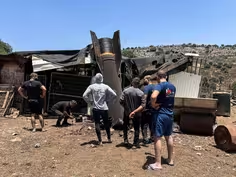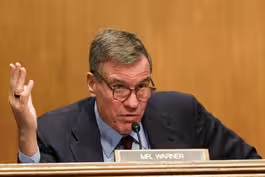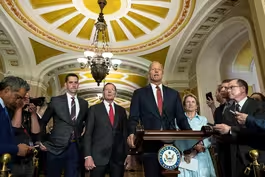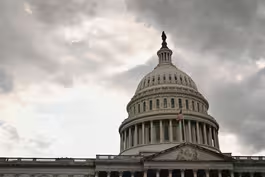
How proposed cuts to Medicaid could affect rural hospitals
Clip: 6/24/2025 | 4m 3sVideo has Closed Captions
How proposed cuts to Medicaid could affect rural hospitals
Rural hospitals across the country, many already struggling to stay afloat, could face devastating consequences if proposed Medicaid cuts in the domestic spending bill become law. To help understand what’s at stake, Geoff Bennett spoke with Tim Wolters, the director of reimbursement for the Citizens Memorial Hospital system in southwestern Missouri.
Problems playing video? | Closed Captioning Feedback
Problems playing video? | Closed Captioning Feedback
Major corporate funding for the PBS News Hour is provided by BDO, BNSF, Consumer Cellular, American Cruise Lines, and Raymond James. Funding for the PBS NewsHour Weekend is provided by...

How proposed cuts to Medicaid could affect rural hospitals
Clip: 6/24/2025 | 4m 3sVideo has Closed Captions
Rural hospitals across the country, many already struggling to stay afloat, could face devastating consequences if proposed Medicaid cuts in the domestic spending bill become law. To help understand what’s at stake, Geoff Bennett spoke with Tim Wolters, the director of reimbursement for the Citizens Memorial Hospital system in southwestern Missouri.
Problems playing video? | Closed Captioning Feedback
How to Watch PBS News Hour
PBS News Hour is available to stream on pbs.org and the free PBS App, available on iPhone, Apple TV, Android TV, Android smartphones, Amazon Fire TV, Amazon Fire Tablet, Roku, Samsung Smart TV, and Vizio.
Providing Support for PBS.org
Learn Moreabout PBS online sponsorshipGEOFF BENNETT: Well, Lisa mentioned those rural hospitals across the country, many already struggling to stay afloat, that could face devastating consequences if those proposed Medicaid cuts in that domestic spending bill become law.
To help us better understand what's at stake, I spoke earlier with the director of reimbursement for the Citizens Memorial Hospital system in Southwestern Missouri, Tim Wolters.
Tim Wolters, thanks so much for being with us.
TIM WOLTERS, Director of Reimbursement, Citizens Memorial Hospital: Thank you.
GEOFF BENNETT: So tell us about your hospital system, Citizens Memorial.
How big of an area do you serve and what's the makeup of your patient population?
TIM WOLTERS: So we serve about a seven-county area in Southwestern Missouri, around 100,000 population.
And roughly 55 percent of our patients are Medicare, 15 percent are Medicaid, and several more that are VA or uninsured.
So about 77 percent of our patients are either government or uninsured.
So that's a very heavy government payer mix.
That's why we're very sensitive to any cuts to that Medicare or Medicaid funding.
GEOFF BENNETT: So if the proposed Medicaid cuts go through, how serious would the impact be on your hospital system?
TIM WOLTERS: What's in the Senate finance bill would probably cut about $3 million per year of funding for our hospital, which would be coming right off our bottom line, when we tend to operate right at break-even.
So we would have to find a way to make up for those cuts.
It's hard to cut expenses at this point, so curtailing services, trying to figure out a way to make up for those cuts would be very difficult for us.
GEOFF BENNETT: Do you worry that rural hospitals like yours might have to shut your doors?
TIM WOLTERS: It's a possibility.
I mean, we are hoping we'd be able to weather that kind of a cut, but we're not positive.
We would certainly cut some services first before we would hopefully get to the hospital itself, and we'd hopefully be able to withstand that.
But a dozen Missouri hospitals have closed in the past decade, and I feel very, very confidently that there would be several more that would close in the light of those kind of cuts.
GEOFF BENNETT: And what's that mean for patient care?
TIM WOLTERS: Well, it would just be further distances they'd be traveling.
They'd be -- right now, we have about - - we're 40 minutes from the nearest urban area, and we're -- with our seven-county service area, we have got patients traveling over an hour just to see us, much less to go on to urban areas.
So, in -- further out in rural Missouri, if those hospitals closed, it's going to be that much further to travel to access care.
GEOFF BENNETT: Missouri Senator Eric Schmitt said recently -- this is a quote -- "The only people that would lose coverage under Medicaid are illegal immigrants and people who don't qualify or people who choose not to work."
From your vantage point, how big of a problem is fraud in the Medicaid system?
TIM WOLTERS: We just don't see that in our patient mix.
I mean, most of our patients are working, for example.
I mean, I'm sure there are some that are not, but in most cases, because they have underlying health conditions or they're taking care of young children or they're elderly, and so we don't see that as a big issue in our area.
So, yes, that's just not our -- not what we are experiencing.
GEOFF BENNETT: As you mentioned, rural hospitals already operate on razor-thin margins.
Is there any capacity, any cushion to absorb potential cuts?
TIM WOLTERS: That's the problem.
We really don't have that much cushion.
As I mentioned, with 77 percent of our patients being government, the only way we could raise rates is on that minor population of 23 percent of our patients that are commercial.
And we don't even have -- as a small rural hospital, we don't have the clout to negotiate better rates anyway from them.
So all -- the only way we can make up for it is to cut expenses, and which may mean cutting services.
And that just hurts -- and that hurts all patients, not just Medicaid patients.
So... GEOFF BENNETT: You have been speaking with lawmakers while you have been here in the D.C. area.
What's the message that you're taking and how is it being received?
TIM WOLTERS: The message is simply, Medicaid is a key part of what we need to operate on.
And we just don't need any further cuts in rural hospitals in particular.
We live on a very thin margin, and so trying to support that care is something we vitally need Congress to do, is continue to support rural hospitals.
GEOFF BENNETT: Tim Wolters with the Citizens Memorial Hospital system in Southwestern Missouri, thanks so much for being here.
TIM WOLTERS: Thank you.
Israel-Iran ceasefire holds as Trump lashes out at both
Video has Closed Captions
Clip: 6/24/2025 | 9m 39s | Fragile Israel-Iran ceasefire holds as Trump lashes out at both sides (9m 39s)
Sen. Warner questions delay of Iran strike briefing
Video has Closed Captions
Clip: 6/24/2025 | 7m 17s | Sen. Warner questions administration's delay of Iran strike briefing (7m 17s)
Time running out for GOP to pass tax plan by Trump deadline
Video has Closed Captions
Clip: 6/24/2025 | 4m 38s | Time running out for GOP to pass massive tax and spending plan by Trump's deadline (4m 38s)
Trump's attempt to claw back funding, explained
Video has Closed Captions
Clip: 6/24/2025 | 7m 23s | Trump's attempt to claw back funding approved by Congress, explained (7m 23s)
What's next for Iran's regime? Analysts weigh in
Video has Closed Captions
Clip: 6/24/2025 | 7m 30s | What's next for Iran's regime after U.S. strikes and Israel ceasefire? Analysts weigh in (7m 30s)
White House set to roll back national forest protections
Video has Closed Captions
Clip: 6/24/2025 | 6m 54s | White House set to roll back protections for nearly 60 million acres of national forests (6m 54s)
Providing Support for PBS.org
Learn Moreabout PBS online sponsorshipSupport for PBS provided by:
Major corporate funding for the PBS News Hour is provided by BDO, BNSF, Consumer Cellular, American Cruise Lines, and Raymond James. Funding for the PBS NewsHour Weekend is provided by...

















